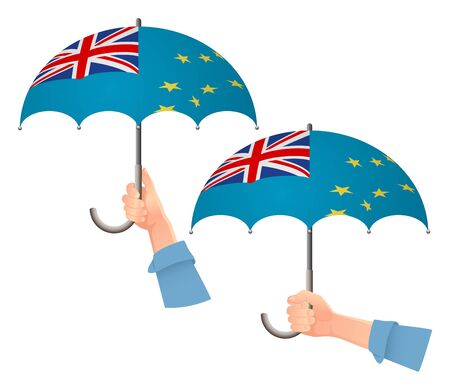Overview of European Health Insurance for UK Expats
For many years, the European Health Insurance Card (EHIC) provided a vital safety net for UK citizens travelling or residing within the European Economic Area (EEA) and Switzerland. The EHIC system was designed to ensure that individuals could access medically necessary state-provided healthcare during temporary stays in another European country, under the same conditions as residents of that nation. This arrangement was rooted in the principle of reciprocal healthcare among EU member states, promoting both mobility and peace of mind for UK expats. However, following the United Kingdom’s exit from the European Union—commonly referred to as Brexit—the established framework has undergone significant transformation. New agreements and updated processes now govern how British nationals can secure healthcare on the continent, making it imperative for UK expats to understand their entitlements and responsibilities in this new landscape.
2. The Impact of Brexit on EHIC and Health Cover Rights
Brexit has fundamentally altered the landscape for UK nationals seeking healthcare in Europe. Before the UKs departure from the EU, British citizens could use the European Health Insurance Card (EHIC) to access necessary state-provided healthcare during temporary stays in EU countries, Switzerland, Norway, Iceland, and Liechtenstein. However, with Brexits completion, the reciprocal arrangements that governed these rights have changed significantly.
The original EHIC issued by the UK is no longer valid for most UK citizens travelling or living in the EEA and Switzerland. In its place, the UK government introduced the Global Health Insurance Card (GHIC), which provides similar—but not identical—protection. It is important for expats to understand which card applies to them, what coverage it offers, and where it can be used. The table below summarises key differences:
| Card Type | Eligibility | Valid Countries | Coverage Scope |
|---|---|---|---|
| UK-issued EHIC (pre-Brexit) | UK nationals resident in UK before 31 Dec 2020 | EU, EEA, Switzerland | Emergency and necessary medical care on same terms as locals |
| GHIC (post-Brexit) | UK nationals ordinarily resident in UK | EU only (not EEA/Switzerland) | Emergency and necessary medical care on same terms as locals |
| New UK EHIC (S1 holders and certain groups) | UK pensioners, students, frontier workers covered by Withdrawal Agreement | EU, EEA, Switzerland | Emergency and necessary medical care on same terms as locals |
Key legal changes:
- The reciprocal healthcare arrangements under EU law no longer apply to most UK nationals except those covered by the Withdrawal Agreement.
- The GHIC does not cover non-EU EEA countries (Norway, Iceland, Liechtenstein) or Switzerland.
- Certain groups—including S1 form holders, some students, and frontier workers—retain access to a new version of the UK-issued EHIC with broader coverage.
This shift means that many UK expats must now check their entitlement carefully before travelling or moving abroad. Understanding these distinctions is crucial for avoiding unexpected medical costs or gaps in health protection while abroad.

3. Understanding the GHIC: The UK’s Replacement Scheme
Following Brexit, the UK government introduced the Global Health Insurance Card (GHIC) as the official replacement for the European Health Insurance Card (EHIC). For British expats residing or travelling within Europe, it is crucial to understand the differences between these two schemes and what practical protections are now available. The GHIC allows UK nationals to access medically necessary state-provided healthcare during temporary stays in most European countries, but its scope differs from that of the EHIC. While the EHIC offered coverage across all EU member states plus a few additional countries such as Norway, Iceland, Liechtenstein, and Switzerland, the GHIC currently provides coverage only within EU nations; it does not extend to the EEA countries or Switzerland unless specific reciprocal agreements are reached.
Key Features of the GHIC
The GHIC entitles holders to healthcare on the same terms as residents of the host EU country, covering emergency treatment and necessary medical care for chronic or pre-existing conditions during your stay. Importantly, it is not a substitute for comprehensive health insurance; it will not cover private medical costs, non-urgent procedures, or repatriation expenses. Expats must also be aware that routine or planned medical treatments are generally excluded unless pre-authorised under specific cross-border healthcare arrangements.
Comparing EHIC and GHIC Coverage
The shift from EHIC to GHIC means UK expats lose automatic access to state healthcare in some non-EU European destinations. For example, if you regularly travel to Switzerland or Norway, your GHIC will no longer be valid there unless separate bilateral agreements come into force. Furthermore, while both cards offer protection against unexpected illness or accidents while abroad in eligible countries, neither covers private care or ongoing medical tourism. It is therefore essential for UK expats to review their own circumstances and consider purchasing additional private health insurance when living or spending extended periods in Europe.
Who Should Apply for a GHIC?
Any UK national planning short-term stays in the EU—such as holidaymakers, students, or those visiting family—should apply for a GHIC before travelling. Long-term residents may still require local registration and health insurance according to their host country’s regulations. The application process is free via the NHS website, and expats should be wary of third-party sites charging unnecessary fees. Keeping your card up-to-date ensures continued access to essential healthcare services abroad under current post-Brexit arrangements.
4. Practical Steps for UK Expats Living in Europe
After Brexit, UK expats residing in European Economic Area (EEA) countries must take specific steps to secure their healthcare entitlements. Navigating the new system can be challenging, but following a clear process will help you access necessary medical care without undue stress. Below, we outline actionable steps for applying for a Global Health Insurance Card (GHIC), highlight required documentation, and clarify the healthcare scenarios covered under this scheme.
How to Apply for a GHIC
The GHIC replaces the previous EHIC for most UK nationals and is your gateway to accessing state-provided healthcare when temporarily visiting EEA countries. The application process is straightforward but requires attention to detail:
- Visit the official NHS website or call the GHIC helpline.
- Complete the online application form with accurate personal details as they appear on your passport or residency documents.
- Submit the application and wait for confirmation; cards are usually dispatched within 10 days if all information is correct.
Documents Needed for Your Application
| Document Type | Description | Purpose |
|---|---|---|
| Passport or ID | A valid UK passport or government-issued photo ID | Proof of identity and nationality |
| NHS Number | Your unique NHS number (if available) | Verification of entitlement to UK healthcare coverage |
| Residency Proof | Utility bill, bank statement, or residence permit (if living in Europe) | Evidence of current address and residency status |
Healthcare Scenarios Covered by the GHIC in EEA Countries
The GHIC provides access to medically necessary state healthcare during temporary stays in EEA countries. However, it does not equate to comprehensive health insurance or cover all treatments. Here’s a summary of what is typically included:
| Scenario | Covered? | Notes |
|---|---|---|
| Emergency treatment (A&E visits) | Yes | Covers immediate and unexpected medical needs |
| Routine maternity care | Yes | If you are not travelling specifically to give birth abroad |
| Treatment of pre-existing conditions | Yes | Covers essential care only during your stay, not planned specialist treatment abroad |
| Planned medical treatment abroad | No* | *Requires S2 form approval from NHS before travel |
| Private healthcare services | No | Covers only public/state-provided facilities on the same basis as local residents |
| Repatriation costs to UK | No | You need separate travel insurance for return travel due to illness/injury |
Important Reminders for Expats:
- The GHIC is not a substitute for full private health insurance—consider additional cover where appropriate.
- If you move permanently to an EEA country, register with local healthcare providers as required by that country’s regulations.
- Your entitlement may change if your residency status changes; always keep your documentation up-to-date.
- If travelling between multiple EEA countries, ensure your GHIC is valid throughout your journey.
If You Experience Issues:
If your application is delayed or rejected, contact NHS Overseas Healthcare Services promptly. For emergency situations while awaiting your card, request a Provisional Replacement Certificate (PRC) from the NHS to guarantee coverage until your card arrives.
5. Limitations and Key Exclusions to Be Aware Of
While the European Health Insurance Card (EHIC) and its successor, the UK Global Health Insurance Card (GHIC), continue to provide valuable access to state-provided healthcare in many European countries after Brexit, it is crucial for UK expats to understand their significant limitations. Firstly, these cards do not cover private healthcare services. If you require treatment at a private clinic or wish to avoid local waiting lists by seeking private care, you will be responsible for all associated costs out-of-pocket. Additionally, routine medical tourism—travelling specifically for planned treatments—is not covered under either EHIC or GHIC schemes.
Another key exclusion concerns long-term residency needs. The EHIC/GHIC is designed for temporary visits or short stays in Europe and does not serve as a substitute for comprehensive health insurance required by expats who become permanent residents. In most EU countries, becoming a resident obliges you to register with the local healthcare system and potentially contribute to national insurance schemes. Failure to comply could leave you without entitlement to public healthcare, and your card may be deemed invalid for anything other than emergency or necessary treatment during brief visits.
It is also important to note that coverage varies between countries. Certain treatments and medications available on the NHS might not be provided under another nation’s public system, and costs you would never face at home—such as prescription charges or ambulance fees—may be payable abroad. Moreover, pre-existing conditions are only covered if the need for treatment arises unexpectedly during your visit; planned care for chronic illnesses is generally excluded unless prior arrangements have been made.
Finally, the cards do not include repatriation costs should you require transport back to the UK for further treatment. Nor do they extend to non-EU countries or some of the newer EU member states where reciprocal agreements have not been established post-Brexit. For these reasons, UK expats are strongly advised to secure robust private health insurance alongside their GHIC/EHIC, ensuring comprehensive protection whatever their circumstances abroad.
6. Alternative Healthcare Options Beyond GHIC
While the Global Health Insurance Card (GHIC) provides essential coverage for UK expats travelling or staying temporarily in the EU, it is not a comprehensive solution for all healthcare needs. Understanding and exploring alternative healthcare options is crucial for UK nationals who are living abroad or planning an extended stay in Europe post-Brexit. This section outlines two primary routes: enrolling in local state health systems and securing private health insurance.
Local State Healthcare Systems
Many European countries operate public health systems funded through taxation or social security contributions. In some cases, UK expats who become legal residents and contribute to the host country’s system may gain access to the same healthcare entitlements as local citizens. For instance, registering with the Spanish social security system grants access to Spain’s public healthcare network, while France offers the Protection Universelle Maladie (PUMa) scheme for legal residents. Requirements and processes vary by country—typically involving proof of address, residency status, and regular contributions—so it is essential to research local rules thoroughly before relocating.
Limitations and Waiting Periods
It should be noted that joining a local system may involve waiting periods or restricted coverage initially. Additionally, some treatments or medications might not be fully covered, requiring supplementary payments or top-up policies.
Private Health Insurance Options
For those seeking greater flexibility, speedier access to specialists, or coverage beyond what state systems provide, private health insurance remains a viable solution. A variety of international health insurance policies cater specifically to expats, offering benefits such as English-speaking customer service, direct billing arrangements with hospitals across Europe, and repatriation cover in emergencies.
Comparing Providers and Policies
UK expats should compare providers carefully, considering factors like pre-existing condition coverage, annual limits, excess payments, and geographical reach. Some well-known insurers offer tailor-made plans for British expats residing in popular destinations such as France, Spain, Portugal, and Germany.
The Importance of Continuous Coverage
After Brexit, maintaining continuous and adequate health insurance is not only prudent but often required by law for residency in many EU countries. Failing to have appropriate cover could result in out-of-pocket expenses or even jeopardise visa or residency applications. Ultimately, combining knowledge of local state systems with robust private insurance can help ensure seamless access to healthcare throughout your time in Europe.
7. Resources and Where to Find Official Guidance
Staying informed and compliant with health insurance requirements as a UK expat in Europe post-Brexit is essential. To ensure you have the most accurate and up-to-date information, it’s crucial to rely on trusted sources. Below are recommended resources for official updates, practical assistance, and further guidance:
UK Government Websites
- GOV.UK: Healthcare for UK Nationals Living Abroad – The official government portal provides comprehensive guidance on healthcare rights, EHIC/GHIC eligibility, and country-specific requirements. Visit the GOV.UK healthcare abroad page.
- NHS Website – Offers updates on health coverage, the new GHIC card, and detailed advice for UK citizens living in or travelling to Europe. Learn more about GHIC.
Local British Embassy or Consulate Contacts
- British Embassies and Consulates – For country-specific issues, lost documents, or urgent support, contact your nearest British embassy or consulate. They can provide tailored advice and connect you with local healthcare authorities. Find your local embassy or consulate here.
European Health Insurance Card (EHIC) & Global Health Insurance Card (GHIC) Information
- Apply or Renew Your Card – Official applications for the GHIC or replacement of expired EHICs should only be made via NHS or GOV.UK websites to avoid unofficial providers charging unnecessary fees.
- Check Validity & Usage Rules – Not all EU countries accept the UK-issued EHIC/GHIC under the same terms; always verify details through official channels before travel.
Additional Support and Advice
- Citizens Advice Bureau (CAB) – While based in the UK, CAB can direct expats to appropriate services and help resolve cross-border health cover queries.
- S1 Form Assistance – For retirees or those entitled to an S1 form, the International Pension Centre offers direct guidance. Contact IPC here.
- Your Host Country’s Social Security Office – Each EU state has its own body responsible for healthcare registration; embassies often provide contact information for these local offices.
Stay Informed: Regular Updates Matter
The landscape of healthcare access for UK expats in Europe may change as Brexit agreements evolve. Always check official sources before making decisions or travel plans. Bookmark relevant government pages and register with your local embassy for alerts on policy changes that could affect your health coverage abroad.


